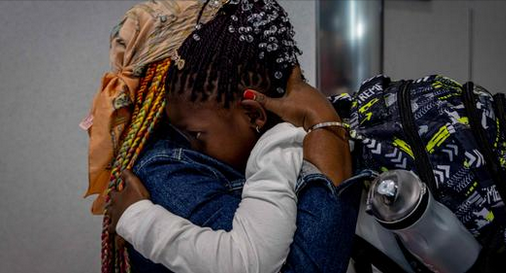On the occasion of the 20 years of the EU Family Reunification Directive, the ICRC and the Red Cross EU Office – representing the National Societies of the EU Member States, Norway and Iceland, as well as the IFRC – call on leaders for a better implementation of the directive so that more migrants can enjoy their right to family life.
STATEMENT 21 SEPTEMBER 2023 BELGIUM
The EU Family Reunification Directive, aimed at enabling family members of non-EU nationals residing lawfully in the EU to join them, has set an important global precedent by allowing thousands of migrants to join their loved ones in Europe. As the directive turns 20, we call on leaders to renew efforts for better implementation so that more migrants can realise their right to family life through swifter and more accessible family reunification procedures.
Family reunification is often the only way for people who have had to flee without their families to maintain family relationships, especially for people granted international protection status who may never be able to return to their place of origin for safety reasons. It is also a key factor in supporting peoples’ social integration.
“I could take care of my own life prospects again,” says a young woman after being reunited with her parents who are sick and dependent on her care. “I was finally able to concentrate again. I decided to improve my German and then to complete a nursing assistant course”. Family reunification represents a safe path to protection for family members, most notably for those with specific vulnerabilities and protection needs. Crucially, making family reunification more accessible would lead to fewer people risking their lives along dangerous migratory routes to join their loved ones.
When people are separated due to armed conflict or other situations of violence, the EU Family Reunification Directive is a lifeline for people seeking to get family members to safety in the EU
Knut Dörmann, Head of ICRC Delegation in Brussels
Despite important progress made since the adoption of the Directive, several obstacles continue to restrict or delay access to family reunification, with harmful consequences for migrants and their families. Often, strict interpretations of family and dependency leave people without relatives to support them, increasing their vulnerability. There are also practical hurdles which can make family reunification a lengthy and unsafe process, including high fees and expenses that lead to longer waiting times, or the need to cross volatile borders to reach European embassies to lodge an application. The absence of functioning services and fear of prosecution in countries of origin can also make getting hold of official documentation difficult, even life-threatening.
The 20th anniversary of the EU Family Reunification Directive is an opportunity for European countries to take stock of its implementation and to address existing gaps. A protection-oriented approach requires a better understanding of the needs of families and procedural flexibilities to protect family unity. The European Commission can play an important role in monitoring implementation, helping Member States to overcome challenges, and supporting the exchange of good practices.
Ensuring that the directive translates into smoother and more humane processes on the ground is essential. This would allow families in need of protection to be able to rebuild their lives in safety in Europe and actively engage with society.
Mette Petersen, Director of the Red Cross EU Office.
National Red Cross Societies in Europe offer a range of services to migrants and their loved ones before, during and after their reunification with support from the ICRC in finding and contacting family members. Building on the International Red Cross and Red Crescent Movement’s longstanding work with separated families, we will continue to work with all stakeholders to support the Directive’s implementation.



Comments